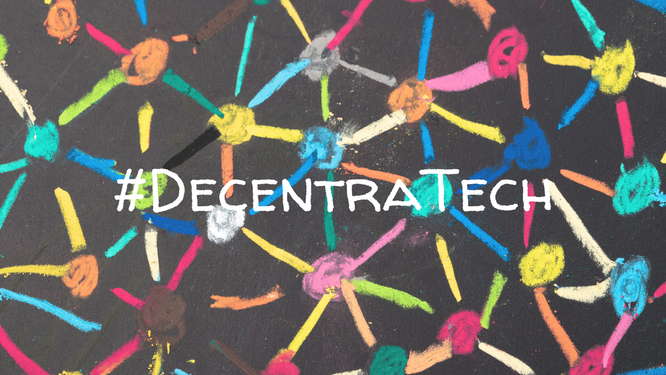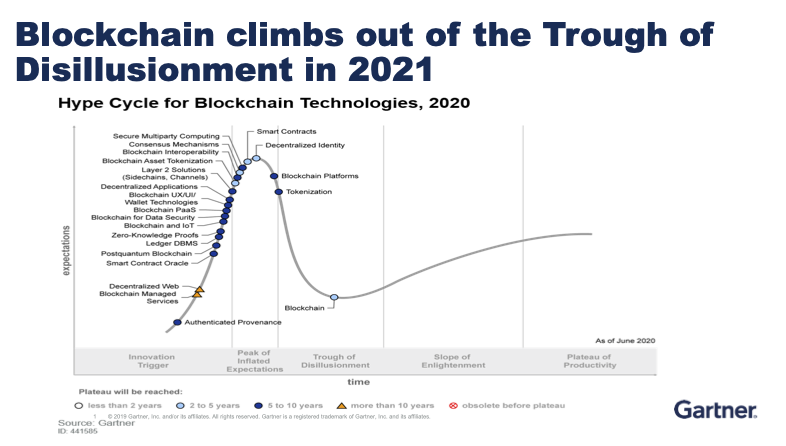|
By Pete Harris, Co-Founder and Executive Director, DecentraTech Collective  DecentraTech is the short notation for decentralization technology. The business world already commonly uses terms like FinTech to mean financial technology, or MedTech for medical technology, or MarTech for marketing technology. Thus, adopting DecentraTech to refer to a collection of technologies that allows decentralization to be adopted by businesses is both consistent and long overdue. To step back for a moment to consult the Miriam-Webster dictionary, decentralization is “the process by which the activities of an organization, particularly those regarding planning and decision making, are distributed or delegated away from a central, authoritative location or group.” The concept of decentralization as an organizational approach is not at all new, having originated in France 200 years ago. Technological decentralization – which in current times is a requirement of most manifestations of decentralization – became a possibility with the creation of the internet, conceived as an open network that anyone can access, based on common standards and with no central governance. Ironically, it is now increasingly accepted that the most popular commercial services delivered via the internet, especially the world wide web, are products of centralized corporations. And many consider that some of those players – including “Big Tech” companies such as Google, Facebook and Twitter – now wield too much control over service provision and personal data ownership for the public good. One of the many with concerns about the power that Big Tech has amassed is Tim Berners-Lee, who created the web in 1990. He is now working on Solid, an open-source effort to reinvent the web so as to allow individuals to control their personal data. More broadly, Web 3.0, a term coined by Ethereum co-founder Gavin Wood, who went on to form the Web3 Foundation, is focused on creating “a decentralized and fair internet where users control their own data, identity and destiny.” As a result of the recent actions of a few high profile companies – including Twitter cancelling the account of the then-sitting POTUS, and online financial app Robinhood suspending retail investor trading in certain wildly popular stocks – calls for the establishment of decentralized services that are censorship-resistant have grown loud. As it happens, Twitter – or at least its CEO Jack Dorsey – has been pondering the responsibilities that come with operating a forum for open discourse in an era where some use it to spread misinformation and hate speech that can have public safety consequences. Following Twitter’s recent decision to suspend and remove a number of accounts, Dorsey wrote (on Twitter) that “I feel a ban is a failure of ours ultimately to promote healthy conversation.” In the future, Twitter might be able to sidestep similar actions by becoming a decentralized service where (presumably) moderation processes would be under the jurisdiction of the crowd. At the end of 2019, it kicked off the bluesky project, which Dorsey characterizes as “an initiative around an open decentralized standard for social media. Our goal is to be a client of that standard for the public conversation layer of the internet.” A few weeks ago, the project released a research paper covering a number of existing decentralized social media ecosystems and noted that it is eager to hear about other projects. “Our DMs are open!” While bluesky is, well, still just that, other decentralized applications (DApps as they are called) of many kinds are already being rolled out. Indeed, the bitcoin cryptocurrency DApp has been operating on its built-for-purpose Bitcoin blockchain for more than a decade. Some blockchain architectures – often referred to as Enterprise Blockchain – have been designed to support business transactions relating to privacy-oriented consortia models. Fabric, an open source blockchain governed by the Linux Foundation’s Hyperledger initiative, has been adopted by the likes of IBM and Oracle for their commercial platform products. IBM’s platform has itself been leveraged by several consortia, such as Food Trust (focused on safety in the food supply chain) and TradeLens (for trade documentation collaboration between all parties involved in international shipping and logistics). Meanwhile, blockchain specialist R3, with its private Corda platform, has worked with a number of financial services and healthcare participants in areas such as trade finance, syndicated loans, claims processing and patient information synchronization. For those wondering whether blockchain is a business reality, Gartner’s latest Hype Cycle chart (below) believes that for enterprises, it’s actually becoming very useful. General purpose public blockchains supporting open-to-all DApps are also emerging (but Gartner shows them as very early stage). The leader today is Ethereum’s mainnet, though other blockchain platforms are fast being adopted for DApps, including Cardano, Hadera Hashgraph, Kadena, Polkadot, NEAR, NEM, Solana, Telos and VeChain.
A wide variety of open DApps have been launched, including cloud-like storage, prediction markets, wide-area mesh networks for IoT devices, provenance of goods in supply chains and consumer-driven advertising. The list seems to expand weekly, if not daily.. Over the past year, the most popular class of DApps have been for Decentralized Finance, or DeFi – a financial system built on DecentraTech and with no intermediaries (like banks or brokerges). DeFi applications now exist for stablecoin payments, lending, exchanges and derivative products. DeFi is hot – since the beginning of 2020, the monetary value of the DeFi ecosystem has risen from around $700 million to nearly $40 billion today. No wonder that some established financial markets players are not only investigating cryptocurrencies like bitcoin but are also now exploring DeFi opportunities. Today, while there is much (often passionate) debate on the relative merits of public/permissionless and private/permissioned blockchain approaches, they both represent degrees of decentralization. “Decentralization isn’t a binary thing, it’s a spectrum,” noted Tushar Jain, a managing partner of crypto fund Multicoin Capital during a webcast discussion. What’s clear, though, is that as the degree of decentralization increases, so too does the complexity of achieving it in a way that is reliable, performant and scalable, while also offering ease of use and safeguards against market volatility, technical glitches and bad actors. While businesses are experiencing a certain FOMO when it comes to opportunities presented by participating in DApps, they need to be able to quantify and mitigate risks – sometimes in order to satisfy shareholders and regulators. So-called Enterprise DeFi is for sure a work-in-progress but this year could see it break out. Joe Lubin, founder of Ethereum specialist ConsenSys, reckons that “DeFi is going to be very attractive to enterprise, and I expect between 9 and 12 months that we’ll see some significant enterprises using DeFi mechanisms.” One of the core goals of the DecentraTech Collective is to educate the business community about real-life experiences with decentralization and the technologies that are enabling it. Blockchain is clearly a cornerstone of what we call the DecentraTech Stack, since it provides consensus mechanisms for participants to agree on particular events/facts, and immutability to ensure that those agreements cannot be tampered with. But DecentraTech encompasses other technologies too, such as cryptographic proofs, decentralized storage, peer-to-peer messaging, self-sovereign identity, and even edge computing. A list of technologies (which is subject to revision and open to debate) that the Collective plans to focus on is posted here. While bringing the business community up to speed on decentralization and DecentraTech is key, the Collective plans to do more than simply provide education. Through its practical advocacy initiatives it will actively work with technology innovators and open-source projects to launch and promote their value propositions. It intends to not only chronicle how businesses are adopting decentralization and provide them with directions but practically accelerate their efforts to do so. Please be in touch if your interest in decentralization, DeFi or DecentraTech has been piqued!
0 Comments
Your comment will be posted after it is approved.
Leave a Reply. |
About the CURATORPete Harris is the Co-Founder and Executive Director of the DecentraTech Collective. He is also Principal of Lighthouse Partners, which provides business strategy services to developers of transformational technologies. He has 40+ years of business and technology experience, focusing in recent years on business applications of blockchain and Web 3.0 technologies. Curated AND FOCUSED CONTENTThe Collective recognizes that there is a wealth of information available from publications, newsletters, blogs, and more. So we are curating 'must read' content in specific areas to help our community to cut through the noise and focus only on what’s important. Archives
February 2021
|


 RSS Feed
RSS Feed


